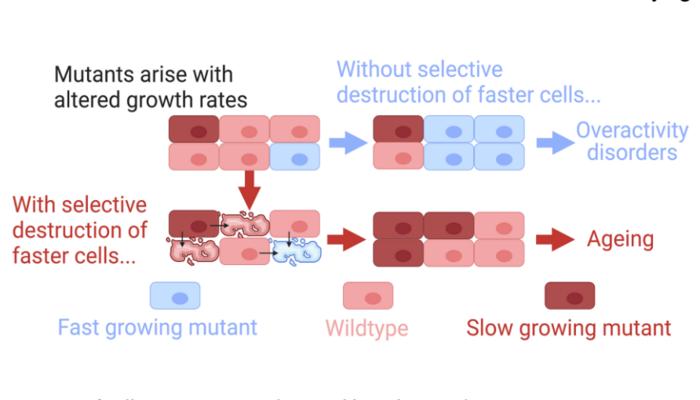“We argue that in multicellular organisms, neighbouring cells are in constant competition.”

Credit: 2023 Wordsworth and Shanley.
“We argue that in multicellular organisms, neighbouring cells are in constant competition.”
BUFFALO, NY- August 9, 2023 – A new editorial paper was published in Aging (listed by MEDLINE/PubMed as “Aging (Albany NY)” and “Aging-US” by Web of Science) Volume 15, Issue 14, entitled, “A novel theory of ageing independent of damage accumulation.”
The underlying cause or causes of aging are an enduring mystery, but in 1977 Kirkwood postulated that organisms might gain a fitness advantage by reducing investment in somatic maintenance if this allowed them to invest more resources in more crucial processes such as reproduction. The accumulation of somatic damage was therefore inevitable, and his disposable soma theory has dominated gerontology ever since.
However, as our understanding of aging increases, it is becoming increasingly difficult to align all the aspects of aging with accumulating damage. For example, mutations that increase damage accumulation can also increase longevity, while rejuvenation revelations such as parabiosis and Yamanaka factors indicate that youthfulness can be regained without high energetic cost and despite high levels of damage.
In their new editorial, researchers James Wordsworth and Daryl Shanley from Newcastle University discuss their recently published paper on selective destruction theory (SDT). SDT suggests a mechanism of aging which is both independent of accumulating damage and consistent with epigenetic rejuvenation. The authors used agent-based modeling to describe how aging could undergo positive selection independent of energetic costs.
“The mechanism of selective destruction is currently theoretical. In our most developed model, we demonstrated that if slow cells induced epigenetic changes in faster cells causing their metabolism to slow (rather than killing them) it not only reduced unnecessary cell death, but also further reduced the likelihood of overactivity disorders by preventing the spread of fast cells.”
Continue reading: DOI: https://doi.org/10.18632/aging.204956
Corresponding Author: James Wordsworth
Corresponding Email: [email protected]
Keywords: ageing, evolution, damage, cell competition, metabolic slowdown
Sign up for free Altmetric alerts about this article: https://aging.altmetric.com/details/email_updates?id=10.18632%2Faging.https://doi.org/10.18632/aging.204956
About Aging:
Launched in 2009, Aging publishes papers of general interest and biological significance in all fields of aging research and age-related diseases, including cancer—and now, with a special focus on COVID-19 vulnerability as an age-dependent syndrome. Topics in Aging go beyond traditional gerontology, including, but not limited to, cellular and molecular biology, human age-related diseases, pathology in model organisms, signal transduction pathways (e.g., p53, sirtuins, and PI-3K/AKT/mTOR, among others), and approaches to modulating these signaling pathways.
Please visit our website at www.Aging-US.com and connect with us:
- SoundCloud
- YouTube
- LabTube
Click here to subscribe to Aging publication updates.
For media inquiries, please contact [email protected].
Aging (Aging-US) Journal Office
6666 E. Quaker Str., Suite 1B
Orchard Park, NY 14127
Phone: 1-800-922-0957, option 1
###
Journal
Aging-US
DOI
10.18632/aging.204956
Method of Research
Commentary/editorial
Subject of Research
People
Article Title
A novel theory of ageing independent of damage accumulation
Article Publication Date
28-Jul-2023




